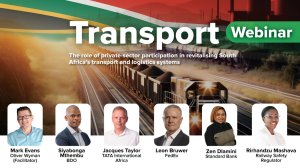Private sector involvement can help unlock transport, logistics efficiencies – panellists

Panellists discuss the role of the private sector in revitalising South Africa's transport and logistics systems
An efficient transport and logistics system can play a significant role in boosting the South African economy, particularly in driving export competitiveness. Private sector participation is, therefore, vital in revitalising the sector and, subsequently, unlocking growth opportunities in a sector long-affected by various challenges.
This was the topic discussed by panellists during Creamer Media’s Transport webinar, held on October 22.
Facilitated by Oliver Wyman partner in the energy and natural resources practice Mark Evans, speakers included Tata International leader for Africa's distribution operations Jacques Taylor, managing partner at BDO South Africa’s Nelson Mandela Bay office Siyabonga Mthembu, Standard Bank executive head of infrastructure and public sector Zen Dlamini, Railway Safety Regulator (RSR) COO Rirhandzu Mashava and FedEx MD of sales for sub-Saharan Africa Leon Bruwer.
Taylor noted that the private sector had demonstrated “overwhelming interest” to help rehabilitate the country’s rail infrastructure and ports, noting that the sector had demonstrated this in its readiness to invest its capital and expertise.
He discussed the importance of an effective transport and logistics system for South African businesses and for the economy, particularly for export competitiveness.
“Any inefficiency that we have in our logistics and transport system adds cost and results in our exporters being less competitive in the global arena and, for me, that's the reason why the private sector needs to get involved to ensure [better] efficiency and to ensure that our business sector is more competitive in the global arena,” he said.
Taylor argued that the private sector should get involved in improving efficiencies by contributing specialised skills, by introducing technology and also by bringing the best practices that can improve performance, especially the performance of the underperforming assets such as the ports and railways.
He also noted that private sector involvement could help end monopolies, noting that the historic monopoly of State-owned enterprises had led to underinvestment, operational failures and the exclusion of the private sector.
“I also think the private sector can assist in accessing capital. I think we all understand the pressures that our budget has and the inability of government to fund all these large projects by themselves. So, I think access to capital is also [an] important aspect the private sector can bring”.
In this vein, Dlamini noted that South Africa had embarked on a massive infrastructure investment drive built on private investment and public-private partnerships to renew infrastructure, which includes transportation, highlighting Standard Bank's role in supporting the various subsectors in this regard.
Echoing this sentiment, Mthembu also pointed out that the government had been making significant changes in improving the transport and logistics sector, highlighting the establishment of the Independent Transport Economic Regulator; the Department of Transport's efforts to strengthen tender divisions, particularly for complex projects; and the adoption of financing models to allow the private sector to participate.
Mthembu also discussed the need for the government to understand the private sector's motivations beyond profit.
“I think they need to understand that the fact that the private sector is getting involved doesn't mean that . . . they [just] want to make profits – they're getting involved because they also want to help in improving the infrastructure of this country and also to contribute in terms of improving the economy of this country.”
With this in mind, Taylor reiterated that effective private sector participation required a supportive legal framework, clear regulations and strong governance.
Echoing this sentiment, Bruwer highlighted the need for streamlined customs processes, entailing improved inter-agency coordination, adopting more digital trade solutions and accelerating the movement of goods to enhance logistics efficiency.
He also highlighted the importance of policy on the consistency of collaboration between public and private stakeholders, as well as the importance of supporting growth, reliability and long-term competitiveness for South African exporters and importers.
“Exporters need predictable rules, transparent enforcement and open channels for public-private collaborations, and I think that is a stoppage at the moment”.
He noted that infrastructure investments needed to be completed to allow the smooth movement of goods through business and international markets, highlighting the role of the private sector in this regard.
“You've got to take lessons learned from other parts of the world and how things work in other parts of the world and bring it back home. We've got a fantastic way of looking at things, we've got the market, we've got the product, it’s just to make sure that we get that over the line.”
Meanwhile, Mashava noted that, for the RSR, the introduction of private sector participation was a significant shift, noting that its regulatory approach was proactively evolving to meet this new reality.
Hence, she pointed out that the RSR was undertaking comprehensive reviews and the modernisation of its regulatory framework to be more agile, to be risk-based and to be outcome-focused.
She said the RSR had also recently reviewed its safety management system determination, which provided more detail on what requirements needed to be met by operators when they apply for or renew their safety permit.
Additionally, the RSR is also enhancing its National Information Management System which simplifies and digitises the application process.
Instead of a “one-size-fits-all approach”, Mashava explained that the RSR was enhancing and moving to a risk-based approach and would now be focusing on operators with higher risks who would receive more frequent and intensive scrutiny than lower-risk operators.
“The most important thing for us is the promotion of culture, as opposed to focusing on compliance. We are going to be engaging with the new entrants very early into their planning phases and this is to foster a proactive safety culture from the outset, thereby enabling us to move beyond a compliance checklist,” she said.
Article Enquiry
Email Article
Save Article
Feedback
To advertise email advertising@creamermedia.co.za or click here
Announcements
What's On
Subscribe to improve your user experience...
Option 1 (equivalent of R125 a month):
Receive a weekly copy of Creamer Media's Engineering News & Mining Weekly magazine
(print copy for those in South Africa and e-magazine for those outside of South Africa)
Receive daily email newsletters
Access to full search results
Access archive of magazine back copies
Access to Projects in Progress
Access to ONE Research Report of your choice in PDF format
Option 2 (equivalent of R375 a month):
All benefits from Option 1
PLUS
Access to Creamer Media's Research Channel Africa for ALL Research Reports, in PDF format, on various industrial and mining sectors
including Electricity; Water; Energy Transition; Hydrogen; Roads, Rail and Ports; Coal; Gold; Platinum; Battery Metals; etc.
Already a subscriber?
Forgotten your password?
Receive weekly copy of Creamer Media's Engineering News & Mining Weekly magazine (print copy for those in South Africa and e-magazine for those outside of South Africa)
➕
Recieve daily email newsletters
➕
Access to full search results
➕
Access archive of magazine back copies
➕
Access to Projects in Progress
➕
Access to ONE Research Report of your choice in PDF format
RESEARCH CHANNEL AFRICA
R4500 (equivalent of R375 a month)
SUBSCRIBEAll benefits from Option 1
➕
Access to Creamer Media's Research Channel Africa for ALL Research Reports on various industrial and mining sectors, in PDF format, including on:
Electricity
➕
Water
➕
Energy Transition
➕
Hydrogen
➕
Roads, Rail and Ports
➕
Coal
➕
Gold
➕
Platinum
➕
Battery Metals
➕
etc.
Receive all benefits from Option 1 or Option 2 delivered to numerous people at your company
➕
Multiple User names and Passwords for simultaneous log-ins
➕
Intranet integration access to all in your organisation


















